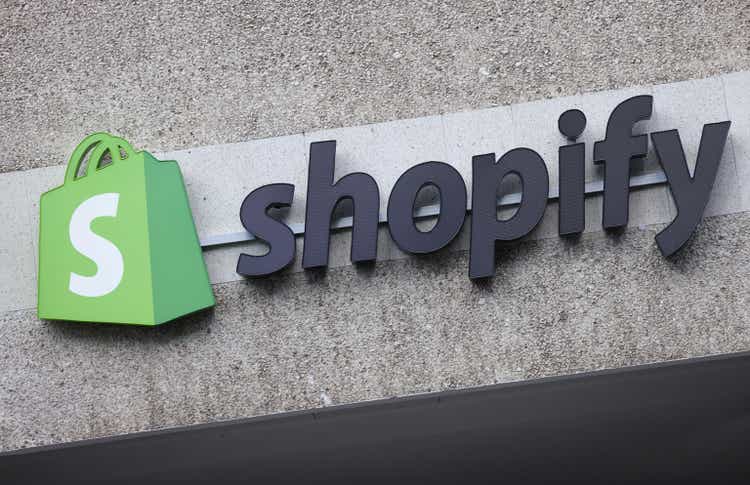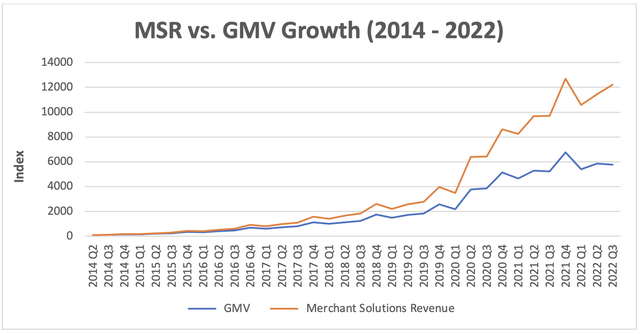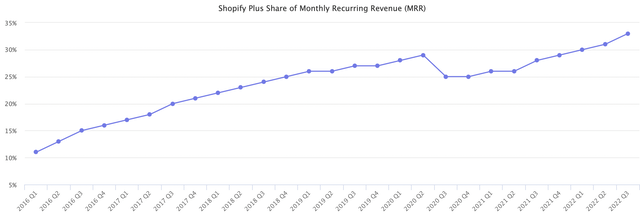Sean Gallup
Shopify (NYSE:SHOP) executives have been proclaiming growth in their Shopify Plus memberships quarter after quarter on earnings calls. The Global ERP Program is a key element of its premium subscription model, and enhances Shopify’s ability to encourage existing merchants to stick to the Shopify platform, upgrade to Shopify Plus, as well as acquire new merchants. Advanced ERP integrations offer strong growth prospects for both Subscription Solutions revenues and Merchant Solutions revenues, creating one more reason to be bullish on the stock.
Shopify’s Global ERP Program
“Enterprise Resource Planning (ERP) is a platform companies use to manage and integrate the essential parts of their businesses…[including] planning, purchasing inventory, sales, marketing, finance, [and] human resources”.
Shopify’s Global ERP Program offers merchants access to the top ERP platforms, including Microsoft (MSFT) Dynamics 365, Oracle (ORCL) NetSuite, Infor, Acumatica, and Brightpearl, and has recently advanced its ERP program to partner with European ERP platforms as well. The program is intended to help larger merchants (Shopify Plus members) better scale business operations, and enables the ERP partners to sell their software solutions to Shopify’s growing merchant base through the Shopify App Store.
ERP Program enhances stickiness of the Shopify platform
Cross-firm data aggregation between Shopify stores and other business divisions allows merchants to gain a more holistic view of their operations and gain real-time insights to make faster, more well-informed business decisions. Enhanced data analytics capabilities enable merchants to better serve their customers and grow their businesses, resulting in higher Gross Merchandise Volume [GMV] being processed through the Shopify platform, and subsequent Merchant Solutions Revenue [MSR] growth.
Chart generated using data from company filings
In fact, Shopify has a great track-record of growing MSR faster than GMV (as seen in the chart above), and the latest quarter sustained this trend, growing 26% and 11% respectively. The faster growth rate of MSR reflects Shopify’s ability to effectively monetize its merchant base through introducing relevant and valuable merchant solutions (such as Shopify Payments, Shopify Capital, and Shopify Fulfillment). Shopify can indeed further leverage the ERP integration capabilities to encourage greater utilization of Shopify’s suite of merchant solutions, and subsequently discourage use of third-party services. For example, Shopify could make it easier to integrate order, shipping, and fulfillment data with ERP solutions when merchants use the Shopify Fulfillment Network instead of Amazon’s ‘Buy with Prime’, conducive to higher MSR growth. Hence, the Global ERP Program enhances Shopify’s ability to cross-sell more of its merchant solutions and capitalize on enterprises’ growth initiatives.
In its annual report, Shopify highlights the risk of losing merchants to other tech companies/ solutions providers that may extend their services to offer e-commerce solutions and compete directly with Shopify:
While we believe no competitor currently offers an integrated, multi-channel, cloud-based commerce platform with comparable functionality to ours, the rapid growth of ecommerce and of independent brands may attract new entrants or new offerings from existing competitors. Additionally, some merchants may elect to piece together technology that overlaps with our own from other providers [e.g. ecommerce software vendors, cross-border services providers, marketplaces, etc.]
Shopify’s Global ERP Program advancements subdue this risk of merchants migrating to an alternative platform in the quest for a combination of e-commerce and other sophisticated business solutions. Enabling unification with industry-leading ERP services through the Shopify App Store also eliminates the need for merchants to subscribe to a third-party service for their ERP integrations, thereby offering more cost-effective accessibility to enterprise solutions.
Business owners are constantly thinking of the future, striving to anticipate shifts in consumer demands and industry dynamics, and how best to navigate the continuous evolvements. The Global ERP Program advances the appeal of Shopify Plus as a one-stop-shop for all business solutions, and enables non-Plus merchants to start envisioning future growth strategies through the Shopify platform, mitigating the risk of losing merchants to competitor platforms, and emboldening Shopify’s upselling strategies towards its higher-end subscription plan, thereby augmenting Subscription Solutions revenue growth.
Emboldened merchant acquisition strategy
On the surface, the Global ERP Program is conveyed as a feature to bolster merchants’ ability to scale and grow using holistic, data-driven insights. The program extends accessibility to Shopify’s merchant base to third-party B2B software companies, though this B2B clientele accessibility could indeed work vice versa as well. Partners of the Global ERP Program, including Microsoft and Oracle, possess extensive and lucrative lists of business clients themselves, and the ERP program eases the migration process into the Shopify ecosystem for these large enterprises, alleviating the hassle of reconfiguring ERP integrations. Hence, this emboldens the ability of Shopify’s sales team to persuade such large enterprises to abandon their legacy digital commerce platforms for Shopify Plus, proclaiming the ease of migration through the Global ERP program. For example, a large enterprise already using Microsoft 365 as an ERP solution would find it easier to migrate to Shopify Plus given that Microsoft can continue to facilitate its existing ERP services through Shopify, thereby smoothening the migration process.
While not all corporations on partners’ clientele lists will necessarily need e-commerce solutions, the ERP partnerships do embolden Shopify’s merchant acquisition endeavors for Shopify Plus. As the Global ERP Program expands to include more and more software providers, Shopify will continue to benefit from easing migration processes for an increasing number of large enterprises.
Furthermore, the Global ERP Program not only facilitates easier migration to Shopify Plus, but can also attract more SME merchants to lower-end subscription plans to start their businesses, buoyed by the confidence that Shopify is well-positioned to support their long-term growth into larger enterprises and eventually become Shopify Plus members. Merchants are inclined to think through their decision regarding which e-commerce platform will serve as the backbone of their enterprises over the long term, and will want to mitigate the need to re-platform in the future to avoid burdensome switching costs. Shopify’s continuous efforts to be a one-stop-shop for all business solutions allows prospective merchants to better envisage their growth pathways through the platform, augmenting the appeal of Shopify’s subscription plans at all levels, and thereby improving Subscription Solutions revenue growth potential.
In fact, Shopify is already benefitting from strong growth in the number of Shopify Plus merchants, both from existing merchants upgrading to the premium plan, as well as larger enterprises joining the platform.
Shopify Plus subscription revenue has grown healthily as a share Monthly Recurring Revenue, and accounted for 33% in Q3 2022. The success reflects the e-commerce platform’s potency at consistently augmenting the value proposition of Shopify Plus through initiatives like advanced ERP integrations. As the Global ERP Program expands to more geographic regions, the value proposition of Shopify Plus should continue to enhance, conducive to Shopify Plus merchant base growth internationally.
Risks
On the one hand, the Global ERP Program advances the one-stop-shop appeal of the Shopify platform, mitigating the risk of losing merchants to other tech companies/ solutions providers that extend their services to offer similar e-commerce solutions. On the other hand, it raises risk of partners collecting data on Shopify Plus merchants, and leveraging the data to compete against Shopify. For example, Oracle also offers its own e-commerce solutions through ‘Oracle Commerce’. The fact that “data will seamlessly…flow directly between their Shopify admin and their ERP” will enable partners like Oracle to gain access to performance and usage data of various Shopify features, which they could use to advance their own e-commerce efforts.
Shopify’s annual report states that:
Our agreements with cloud hosting, technology, content and consulting providers are typically non-exclusive and do not prohibit such service providers from working with our competitors or from offering competing services.
In fact, not only can partners offer competing services, but the non-exclusive nature of its agreements means that Shopify’s competitors can also replicate this strategy with the same ERP platforms, undermining its competitive edge and its ability to attract large enterprises to Shopify Plus over rivals’ platforms.
Furthermore, the Global ERP Program raises third-party delivery risks. ERP implementations and integrations are complex in nature, and there is no guarantee that all consolidation efforts will work out smoothly and effectively. Circumstances where integrations do not work efficiently, or do not deliver competent results, could lead to negative impressions of the Shopify platform that induce migration to competing platforms offering similar ERP integration services.
Summary
The Global ERP Program advances the appeal of Shopify Plus as a one-stop-shop for all business solutions, and enables non-Plus merchants to start envisioning future growth strategies through the Shopify platform, making the platform stickier for all merchants. The program also emboldens Shopify’s merchant acquisition strategy across partners’ clientele of large enterprises, enabling the sales teams to leverage the smoother migration process as part of their sales pitches. Hence, the Global ERP Program improves top-line revenue growth prospects, through both merchant retention and acquisition advancements.
The non-exclusive nature of the partnership agreements and the sharing of merchant data with potent competitors undermines Shopify’s competitive edge to a certain extent. That being said, Shopify’s brand power and persistent innovation to advance its distinctive and unmatched product offerings subdue the risk of merchant loss to competitors attempting to replicate Shopify’s e-commerce solutions. Despite the intensifying competitive landscape of the industry, the e-commerce industry continues to benefit from secular growth trends, and Shopify is well-positioned to capitalize on the digitalization of the economy.



Be the first to comment